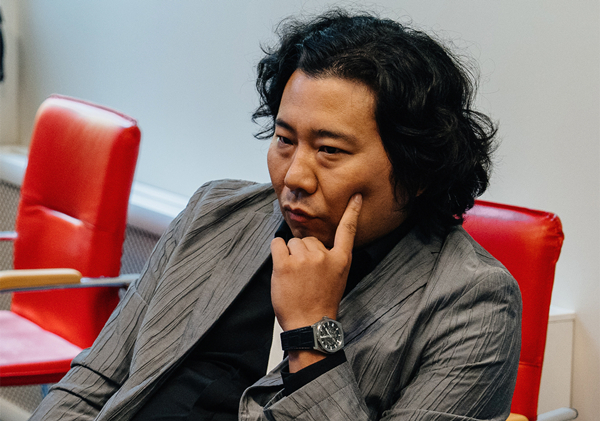
 0 Comment(s)
0 Comment(s) Print
Print E-mail China.org.cn, September 2, 2024
E-mail China.org.cn, September 2, 2024
As the inaugural Moscow International Film Week (MIFW) concluded on Aug. 28, a veteran film producer from China reflected on how Chinese filmmakers can learn from the Russian film industry and proposed future in-depth cooperation.

A photo capturing Du Liang, a Chinese film executive, ruminating during a press event at the Moscow International Film Week. [Photo provided to China.org.cn]
Having not visited Moscow for four years, Du Liang, chairman of Beijing Airmita Culture Development Co. Ltd. and a long-time promoter of Chinese-Russian cultural exchange, felt both refreshed and rejuvenated while attending MIFW. "It's like a big festival, and international cooperation seems to be back at the peak of enthusiasm after the COVID-19 suspension," he said.
The MIFW saw more than 600,000 attendees, including film companies, producers, screenwriters and guests from 47 countries. During the bustling film week, Moscow's municipality also signed nine partnership agreements with both Russian and foreign organizations, according to Mayor Sergei Sobyanin.
Film screenings, cultural and business programs, master classes, forums and tours of famous filming locations were held throughout the city, with the Moscow Film Industry Moskino Cluster highlighted.
With Russia's approach to foreign peers in the film industry, Du felt that China could collaborate with Russia in many aspects, including film distribution and co-production.
He suggested that finding a good story is the most important and most difficult task, proposing more Chinese remakes of some creative Russian films. The film executive also pointed out that Russia has many talented filmmakers who, by growing up in a nation with a solid cultural and art education, have cultivated an appreciation for very high aesthetics.
Another advantage he mentioned is Russian filmmakers' specialization in genre films, particularly sci-fi and space films. "They have their own technological intellectual properties, specialized studios, and unique filming techniques and solutions. With a vast number of films produced, they've accumulated rich experience, skilled teams and advanced technical equipment, enhancing their strength with specialization," Du explained.

A photo captures Du Liang, a Chinese film executive, sharing his insights at a forum during the Moscow International Film Week held in Moscow, Aug. 27, 2024. [Photo provided to China.org.cn]
Du mentioned that the Chinese and Russian film industries could complement each other well, citing that Russia with its heavy industry-level production and professional talent and China with its creative teams, delicate scripts and large market would boost box office potential, ensuring mutual benefits.
There are prospects for Chinese teams to shoot films in Russia, and for Russian teams to shoot in China. But with this, Du emphasized the need for an official platform to facilitate this kind of collaboration. "We're actively promoting a government-led platform, which is crucial," he stated.
The film executive noted that the Chinese film market is still adjusting, and everyone is back on the road to exploring what could succeed in China. "Our previous experience is outdated; we need to re-evaluate, observe and make new judgments. You always need to provide fresher, different things to audiences, even if you want to follow up in a popular genre, and always ensure quality."
"In China, our unique requirements stem from our audience's special demand for emotional depth. I think we have high global standards for emotional delicacy and impact, which are crucial for both Chinese cinema and co-productions," he added.